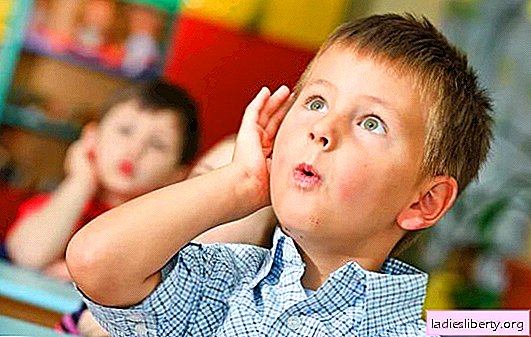
The ability to distinguish and correctly pronounce the sounds of native speech is the main condition for the successful education of a child in primary and secondary school.
In kindergartens, preparation for entering the first grade is carried out as part of the educational program for preschool children. But parents also have a big responsibility: for the baby’s speech apparatus and thinking to develop correctly, you need to constantly train his phonemic hearing.
What is phonemic hearing
If a child’s speech after three or four years is slurred, it replaces or confuses sounds in syllables, it can be said that the phonemic hearing is undeveloped. Both teachers and parents urgently need to engage in the development of the baby’s speech in order to eliminate violations. Maybe this is a physical pathology: hearing loss in a child. In this case, the help of doctors is required. Or, perhaps, the kindergartner needs other help: regular exercises for the development of phonemic hearing.
This type of hearing is more subtle, it is it that allows the child to recognize the sound, systematize and distinguish different sounds, and then use this information in his own speech.
Parents can determine whether phonemic hearing is well developed by the following speech operations:
• the child hears a certain sound in the word, confidently calls it or says that there is no named sound;
• the child distinguishes words that are similar in sound but different in meaning;
• he distinguishes between words consisting of the same phonemes.
The brain of babies develops intensively, and a full-fledged phonemic hearing allows them to solve not only speech, but also logical, moral, aesthetic tasks. The sooner you begin to develop it, the more successful a small person will grow socially and educationally. The native language provides full communication with peers and adults, develops the psyche, allows you to join the culture.
In the formation of a child’s personality, it is language that plays a unique role. It is the point at which emotions and thoughts, memory and imagination converge. On the one hand, the child must be taught to recognize sounding speech, on the other hand, to use it correctly.
Why develop phonemic hearing
The formation of speech skills begins from the first minutes of a newborn's life - with his cry, walk, babble. But the baby consciously pronounces the first words by the end of the first year of life. During the second year, the ability to pronounce words is improved, but the pronunciation remains unclear and inaccurate. By the end of the third year of life, one can already trace the first signs of imperfection of phonemic hearing:
• it is difficult for a child to pronounce words consisting of more than two syllables (a syllable is a combination of consonant and vowel sounds);
• The child skips syllables in words and replaces sounds.
If the environment is favorable, the child hears the correct speech, communicates a lot, then by the age of four the situation improves. In his own speech, long words from several syllables and hissing sounds appear, but there are problems with the difficult sounds of R-L-Y. This is where it’s worth the work, so as not to make the wrong pronunciation the norm. At five years old, a preschooler must learn to pronounce all the sounds correctly, hear the syllabic construction of the word and accurately reproduce it.
What happens if a child does not cope with the language load, and there is no timely help in the development of phonemic hearing? Persistent speech disorder due to incorrect perception and pronunciation of words will appear. Violation of pronunciation standards is a serious defect, which in speech therapy practice is called phonetic-phonemic underdevelopment of speech and automatically makes a primary school student a potential two-member, maximum three-three in Russian.
Unable to distinguish between individual sounds and syllables, the student will not learn to analyze the word, divide it into syllables and morphemes (parts), see the spelling - that is, a dangerous place in which you can make a mistake. Even spelling the word correctly will be impossible, that is, a persistent violation of the rules of the graphic will form.
Problems cannot be avoided in lively, sounding speech. Active vocabulary will remain poor, understanding of the grammar of the native language will be impaired. The child will not be able to read correctly, create his own statement, intonate individual sentences and the text as a whole, it will be difficult for him to adjust the pace and volume of speech, correctly pronounce complex words. This means that inevitably there will be psychological discomfort that will affect behavior.
Is phonemic hearing necessary? The answer to this question is obvious. And you need to start not on the eve of admission to first grade, but much earlier. It is better to start classes from the age of three, and then constantly devote as much time as possible to speech practice.
How to develop phonemic hearing
The work of a speech therapist, teacher or parent is to teach the child the simplest ways to analyze the word:
• correctly put emphasis;
• syllable;
• understand the meaning and meaning of each sound in a word;
• highlight consonants and vowels.
By teaching children to solve these problems, you can perfectly prepare them for the most important stage of training - learning to analyze the sound composition of a word. Learning how to differentiate sounds and pronounce them correctly, kids will quickly master the basics of proper reading and spelling.
What helps the development of phonemic hearing? Exercises! The most effective ways to work with babies are described below. But to begin with, we note that the methodology is based on sequential testing six steps:
• The basis of phonemic training is the recognition of sounds made by various objects (the so-called non-speech sounds);
• distinguishing timbre, strength, pitch, that is, sounding lively speech;
• distinguishing words that are very close in sound (a set of phonemes);
• distinguishing between individual syllables;
• discernment of individual speech sounds;
• mastering the basics of analysis and synthesis of words.
Mastering the exercises for each stage is easy. The form of the game for the child is natural, does not cause rejection, being the only acceptable for kids. It remains to prepare handouts for classes on the development of phonemic hearing (photos and pictures cut from magazines, sounding objects, etc.) and study the working method.
First stage
The initial stage of work allows you to create a base, a foundation for the development of subtle hearing and is suitable for very young children. What do we have to do? Play! For example, in the game "Guess what sounds." Everyday situations can be beaten by any: the noise of pouring water, the clatter of dishes, the steps of a person, the meow of a cat, the rustling of paper.

Other exercises for this step:
• "Magic sounds." Together with the child, fill woven bags, opaque plastic containers or just matchboxes with any “sounding” materials: cereals, metal clips, buttons. You need to guess by the sound that is inside.
• The usual "Zhmurki" is perfect for solving phonemic problems. The child needs to move to the agreed sound, for example, clapping or ringing a bell.
• The Magic Pencil. Give the child a regular pencil in their hands and ask them to knock on objects of different colors made of wood, glass, metal, paper.
• "Clap!". The child needs to repeat the rhythm of pops and alternating pauses of different lengths for adults. First, the exercise is done with open eyes, then you can complicate: blindfold your eyes with a scarf or just close them.
To make it clear how to practice, watch informational videos about the development of phonemic hearing. Video will help not only understand the logic of the lesson, but also master the most effective working methods.
Second phase
At the next level, you need to show the child the difference in the quality of sounding human speech.
• "Who's talking?" Record on the recorder the voices of adults familiar to the child (mother, grandmother, father, brother or sister), and be sure - the voice of the baby. The path guesses who owns the voice.
• "Three Bears". This is an imitation exercise. Read the tale of the three bears together, and then speak for the characters. The child should guess when the bear mom, the dad bear, and the teddy bear say.
• "Loud or quiet?" Think up actions which the child should carry out at a quiet mother's voice and at a loud.
Third stage
Recognizing words is a big job for the brain. The main thing is to understand how to do the right exercises for the development of phonemic hearing. The pre-school child is ready to move to the next level as soon as he begins to correctly cope with the tasks.
• "Right wrong". Prepare vivid pictures of different objects. Show from the baby and name, but not correctly, but replacing the first letter of the word with another. For example, instead of a cow - hog, instead of a chair - phthul, instead of a cup - porridge, etc. Hearing the correct word, the child slams his hands or dips his foot.
• "Choose". Stick on a cardboard pictures with words that are similar in sound (cat-bear-mouse; onion-beetle-bitches; goat-braid-dew). Mom says the word, and the child chooses the right picture.
Fourth stage
Learning to distinguish syllables. It is important to give a primary idea of what a syllable is. You can start with the fact that words can be short and long. Then, clapping, using intonation, divide words by vowel sounds into parts.
• The child first pronounces the words with his mother, then tries to divide them into parts on his own. We speak and clap: ba-bush-ka, ba-ka, kosh-ka, ma-ma, for-on-weight-ka, lo-pat-ka, cro-wat-ka, etc. As soon as the child grasped the essence, we ask him to slander the words on his own.
• "Get out". The child’s task is to hear what syllable is in the row. For example, an adult says: shi-shi-shi-ji-shi. Hearing a resounding "Ms", you need to slam.

Fifth stage
Simple for children's perception, but a very important stage is the correct pronunciation of sounds. You can introduce the concept of "sound", saying that each word consists of several sounds. And then play them.
• "I recognized you!" Agree with the child what kind of sound he should learn. Then the adult makes several sounds in a row, and the child, having heard "his" sound, claps his hands.
• "Who sounds?". For the development of phonemic hearing, the simplest exercises are imitations. For example, you need to reproduce the sounds of nature: the buzzing of a mosquito (w / w / w), the growl of a tiger (rr-r), the singing of a draft or wind (s-s-s).
• You can play with the baby the other way around. Mom makes a characteristic sound, and the child must guess what it sounds like.
Sixth stage
The highest level of difficulty is analytical. Here it is required to collect all the knowledge that a child has. Here are some examples of exercises.
• "Count the sounds." An adult makes one sound or a complex sound combination, and the child has to determine the number of sounds (III - 1 sound, Dio - 3 sounds).
• "Lost Letter". An adult calls a word, skipping one sound. The child needs to find the missing letter and name the sound (bird ... ka, s ... ol, we ... oh).
• "What's inside?" The adult names the letter that the child should hear in the middle of the word, and pronounces the words. As soon as the desired sound sounds, you need to slam (l - stick, f - waffle).
Mastering the methods of developing subtle hearing is not as difficult as it might seem. The most effective exercises for developing phonemic hearing are those in the process of which the child listens, analyzes, acts (claps or stomps) and makes sounds himself.
Being engaged with the baby from the first years of life, parents anticipate the formation of speech disorders and prepare the child to master reading and correct writing. Well, if the violation has already appeared or is just beginning to take shape, then regular classes will help to cope with the problem faster.











